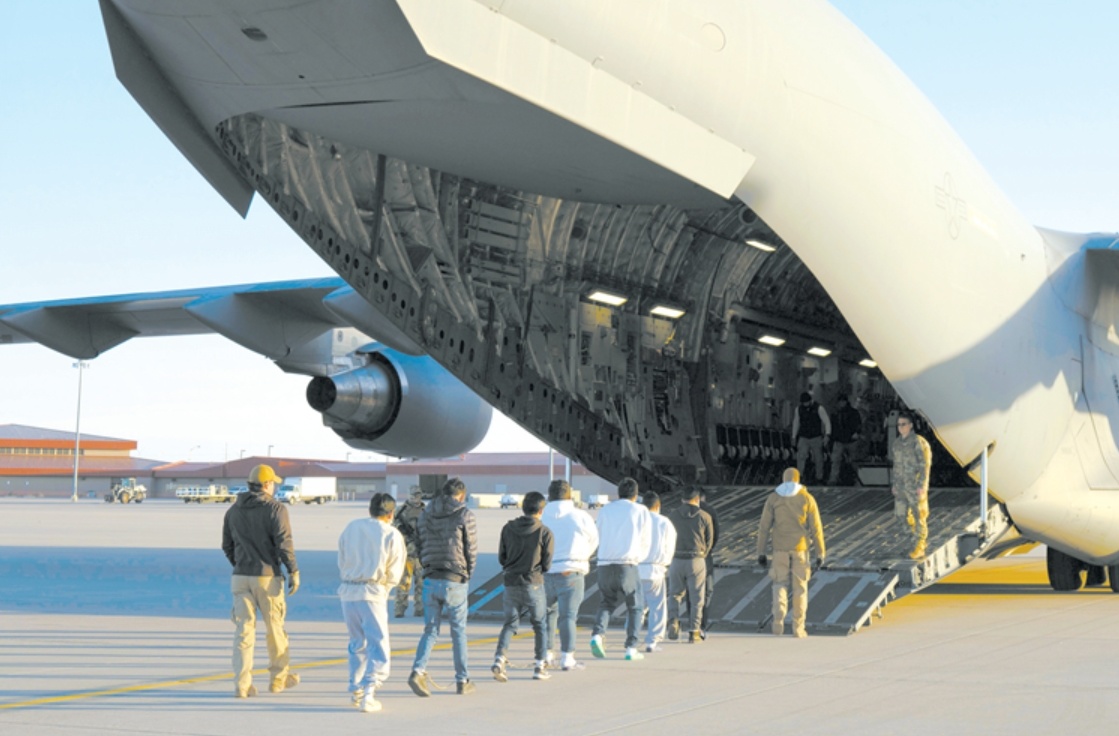
At the beginning of 2025, the United States witnessed an unprecedented major overhaul of its immigration policy. Following Donald Trump's return to the White House, the US swiftly launched a large-scale operation to deport undocumented immigrants, which has sparked widespread controversy domestically and far-reaching implications internationally.
On January 23, 2025, White House Press Secretary Levitt officially announced that the "largest deportation operation of undocumented immigrants in US history" was underway. She revealed that on the first day of the operation alone, US federal agents arrested 538 undocumented immigrant criminals and used military aircraft to transport hundreds directly out of US territory for deportation. The next day, another 593 undocumented immigrants were arrested, awaiting deportation. In just two days, over 1,100 undocumented immigrants were arrested and deported, a shocking number.
The backdrop to this operation is the Trump administration's determination to take a tough stance on undocumented immigrants. On his first day in office, Trump declared a state of emergency at the southern border, calling for increased personnel and resource deployment, as well as the construction of physical barriers to stop all undocumented immigrants from entering the country. This move aims to obtain more power and resources to control the border and ensure national security.
In addition to strengthening border control, the Trump administration has also expanded the scope of expedited removal. According to the Associated Press, the Trump administration announced a nationwide expansion of expedited removal, allowing immigration officers to deport undocumented immigrants without judicial review, making the deportation process quicker and easier. This policy has sparked widespread controversy, with many believing it violates the basic human rights of undocumented immigrants and may lead to mistaken deportations and abuse of power.
Apart from expanding expedited removal, the Trump administration has implemented several other immigration policy reforms. These include deploying troops to the southern border to prevent undocumented immigrants from entering, expanding the arrest and detention powers of the US Immigration and Customs Enforcement (ICE) agency, halting the processing of immigration and asylum applications, and canceling existing immigration application appointments. These measures collectively form the framework of the Trump administration's comprehensive tightening of immigration policy.
The changes in the Trump administration's immigration policy have not only sparked controversy domestically but also had a widespread impact internationally. As the United States' neighbor, Mexico anticipates that Trump's deportation order will lead to a surge of immigrants, and has therefore begun constructing large tent shelters in nine border cities to house deported undocumented immigrants. The Mexican government has stated that it will cooperate with the United States to address this issue and has announced the establishment of reception centers for deported immigrants. However, the Mexican government also faces enormous economic and social pressures, and how to properly accommodate these deported immigrants has become a severe challenge.
Besides Mexico, other countries have also expressed concern and criticism over the Trump administration's immigration policy. Many countries believe that the US approach lacks humanitarian spirit and may damage the US's reputation in the international community. From a diplomatic perspective, the Trump administration's immigration policy may also impact the US's diplomatic relations with other countries. Some countries may reduce cooperation with the US in areas such as counterterrorism and climate change due to dissatisfaction with its immigration policy. This will be detrimental to the US's ability to play a leadership role and safeguard its interests in international affairs.
From an economic standpoint, undocumented immigrants perform many low-skilled labor jobs in the US, such as in agriculture and construction. These industries often face labor shortages, and the presence of undocumented immigrants alleviates this shortage to some extent. However, large-scale deportation of undocumented immigrants may further exacerbate labor shortages in these industries, affecting the stability of the entire economic supply chain. For example, the agriculture industry may face production cuts due to labor shortages, and the construction industry may see increased construction costs due to labor shortages. Furthermore, the consumption and tax payments of undocumented immigrants in the US have also contributed to the US economy to some extent. Large-scale deportation of undocumented immigrants may lead to a decrease in this consumption activity, thereby affecting the overall performance of the US economy.
In the face of the widespread controversy and criticism triggered by the large-scale deportation of undocumented immigrants, the US government needs to carefully reflect on its immigration policy and seek a more balanced and humane solution. Although the Trump administration's immigration policy has strengthened border control and national security to some extent, it has also brought many negative impacts. The government needs to weigh the pros and cons and formulate a more reasonable and humane immigration policy to address the current issues.
In summary, the changes in the Trump administration's immigration policy have attracted widespread attention and controversy both domestically and internationally. The large-scale deportation of undocumented immigrants not only tests the government's execution capability and credibility but also challenges society's inclusivity and humanitarian spirit. Facing this challenge, the US government needs to carefully reflect and seek a more balanced and humane solution to address the current immigration issues.

Driven by the Trump administration's push to relax financial regulations and the recovery of investment banking business, the market value of the six major banks in the United States has cumulatively increased by approximately 600 billion US dollars by 2025.
Driven by the Trump administration's push to relax financia…
On Christmas evening, U.S. President Trump posted on social…
According to multiple foreign media reports, the recent fin…
The middle class, once regarded as the cornerstone of Ameri…
On December 19th local time, the US military launched a lar…
The Boxing Day sunshine should have cast a false glow of pr…